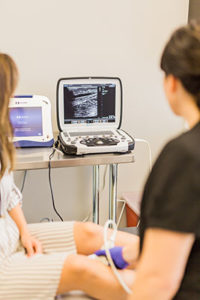Did you know that untreated vein disease could lead to leaky veins? And, when you have leaky valves or veins, you may develop edema or vascular congestion, a condition that could cause your feet to turn blue due to constriction in the small blood vessels that feed your extremities?
Well, it's true, and it's one of the biggest reasons why we want you to stick with preventative health care. Being proactive about your vein health can help you avoid a medical emergency. This is something New York City mom Tammy Fried learned the hard way. While she was 28 weeks pregnant!
Back in May 2020, Tammy told the Today show that she woke up feeling something wasn't right. Soon, she had a nose bleed, and started coughing blood! She called for a virtual emergency room visit, and luckily, got sent to the real hospital immediately!
Once there, doctors discovered that one of her abnormal blood vessels burst. Now, that leaky vein was spilling blood into her lungs. Fortunately, there was an interventional radiologist on call at the hospital. So, he could plug the hole with minimally invasive treatments. And she could avoid surgery, helping her recover. And, two weeks later, deliver her baby boy, now nicknamed Miracle Max!
Of course, we want our patients to avoid emergency situations like Tammy's. So, if your legs are tired, heavy or cramping, your may need a diagnostic ultrasound from your vein specialist. If that is the case, you may be wondering: how will an ultrasound uncover what’s going on inside my legs? Isn’t that kind of technology more common in Obstetrics offices?
Well, you’re partially correct: interventional radiologists use a different kind of ultrasound to diagnose conditions like Peripheral Arterial Disease (PAD.) The technology we use is known as a Doppler ultrasound. And in this post, we’ll teach you how it helps us detect many different kinds of vein disease. 
Doppler ultrasounds check your blood flow. They help us discover whether you have problems like narrowing or leaky veins or blockages in your blood vessels.
This type of ultrasound uses sound waves to check how well blood flows through your legs. Those waves bounce off your moving blood cells, giving your doctors a better picture of the speed and health of your blood flow. Doppler ultrasounds involve hand-held devices; screenings are pain free and non-invasive.
Using a Doppler ultrasound, vein specialists can detect disruptions in your blood flow, hardening of your arteries and even potentially life threatening conditions like Deep Vein Thrombosis (DVT), a blood clot that develops in the deep veins of your legs that rest well below the skin’s surface.
We may recommend an ultrasound if there are signs that your blood flow has been reduced. These symptoms can include changes in the appearance of the skin on your legs, leg pain that appears with movement, hair loss on your legs or even wounds that won’t heal.
If you’ve had a blood clot, or we suspect you have one, a Doppler ultrasound can quickly confirm this diagnosis.
We may also recommend a Doppler ultrasound if you’ve recently had a stroke or heart attack. That way, we can determine whether compromised blood flow or clots may be putting you at risk for a repeat problem.
You'll typically lie down for your ultrasound. Your ultrasound technician may measure pressure in certain areas of your body by apply blood pressure cuffs at points like your ankles, calves or thighs.
Next, your technician will apply lubricant to the ultarasound guide (called a transducer). Then he or she will move the device over your skin until we receive a good image of your blood flow. A Doppler ultrasound typically takes up to 45 minutes. Once it’s done, you are usually free to get up and go back to your daily activities.
When you have an ultrasound in our Houston and Dallas area vein clinics, your results will be reviewed and delivered to you by one of our highly trained team members. If a problem is detected, we will then take the time to discuss and explain your diagnosis, and walk you through all your possible treatment options.
Sounds like an easy way to prevent medical emergencies, right? That's because it is! So don't wait another day, worrying that your damaged veins may leak. Instead, schedule an appointmentschedule an appointmentschedule an appointment with our team today. We'll give you a better picture of your health, and protect you from problems that could already be developing!

Scheduling
Please contact our dedicated specialists to schedule a consultation today.
2024 Texas Endovascular. All rights reserved. Website Design by Healthcare Success